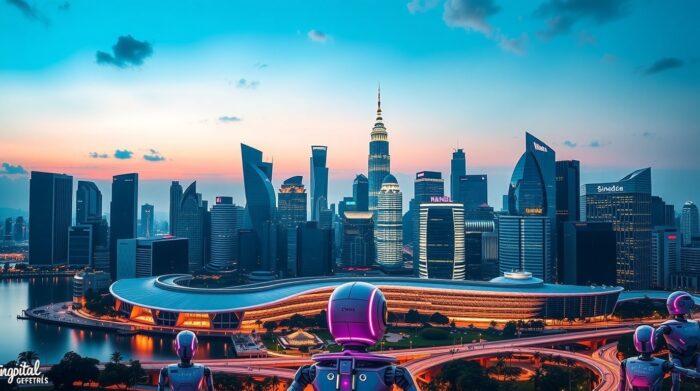A New Age of Content Arrives in Singapore
Singapore’s content ecosystem has always been ahead of the curve, but recently, it has shifted into an entirely new rhythm. Brands, agencies, and public institutions now operate at a pace that demands speed, clarity, and a relentless output of high-quality communication. In this evolving environment, a new strategic tool has become indispensable.
This technology isn’t a shortcut—it’s a catalyst. It helps teams create content that’s sharper, more consistent, and more scalable than traditional workflows allow. As digital expectations rise across finance, healthcare, tech, education, and retail, organisations are increasingly turning to AI Content Generation to respond with precision and speed.
Rather than replacing the creative mind, AI supports it. It boosts ideation, accelerates turnaround time, and removes bottlenecks that have long limited content teams. Whether it’s for product descriptions, social campaigns, narrative proposals, or multilingual messaging, AI Content Generation helps bridge the gap between ambition and execution.
What’s happening in Singapore isn’t a trend—it’s a structural shift. As demands grow, the content leaders of tomorrow will be the ones who embrace tools like AI Content Generation and know how to use them with strategic intent.

The Evolution of AI Content: From Basic Scripts to Strategic Intelligence
Not long ago, automated text felt mechanical and uninspired. Today, the transformation is undeniable. Modern AI Content Generation can draft long-form articles, brainstorm creative directions, refine brand tone, and assist with entire content strategies.
Its origins were humble—templates, rule-based responses, and rigid scripts. But as machine learning evolved, AI learned to understand tone, read context, anticipate user intent, and generate narrative flow. This leap changed everything.
Now, teams in Singapore rely on AI Content Generation to support research, enhance clarity, improve structure, and speed up output. Its value is especially clear in multilingual environments, where content must remain sharp, culturally aligned, and consistent across multiple languages.
What makes this shift remarkable is how AI has moved from being just a writing tool to becoming a strategic partner. It helps teams think faster, plan smarter, and communicate with greater precision. And with each iteration, AI Content Generation continues to deepen its impact on Singapore’s digital communication landscape.

Singapore’s Digital Momentum: A Market Ripe for AI Transformation
Singapore’s digital-first culture makes it the ideal environment for AI Content Generation to flourish. Businesses across the island are producing more content than ever—social posts, newsletters, stakeholder reports, e-commerce listings, training materials, campaign scripts, and more.
But volume isn’t the only challenge. Speed, relevance, and accuracy matter just as much. Audiences expect immediacy. Customers expect precision. Teams expect tools that can keep the workflow moving.
This is where AI Content Generation becomes invaluable.
Marketing agencies tap AI to support ideation and accelerate early drafts. Corporate teams use it to streamline internal communication. E-commerce brands rely on it to update thousands of product listings efficiently. Even small businesses—often short on manpower—are turning to AI Content Generation to stay competitive in Singapore’s fast-paced digital economy.
The demand curve is rising, and content expectations are tightening. Singapore’s readiness to embrace this shift confirms one thing clearly: AI Content Generation is not just useful—it’s inevitable.

The Tangible Benefits of AI for Singaporean Businesses
The advantages of AI Content Generation are direct, measurable, and aligned with Singapore’s high-performance culture.
Speed is the most immediate benefit. AI can draft, refine, and restructure content in minutes, helping teams produce more without burning out. For industries with heavy output—finance, retail, logistics, hospitality—this efficiency becomes a strategic necessity.
Next comes consistency. Whether it’s brand tone, linguistic clarity, or messaging accuracy, AI Content Generation helps organisations maintain a unified voice across communication channels.
Cost efficiency is another major driver. Companies no longer need to expand writing teams or outsource massive volumes of repetitive content work. AI handles the operational load while human talent focuses on strategy and direction.
Multilingual adaptability also stands out. Singapore’s diversity creates a constant need for content that connects across English, Mandarin, Malay, and Tamil. Supports rapid language shifts without sacrificing quality.
And perhaps most valuable of all, AI provides data-driven insights. It helps refine SEO direction, sharpen messaging, and inform content planning—all essential for staying competitive.
This is why more Singaporean businesses are adopting AI Content Generation as a core part of their content operations.
The Powerful Use Cases Transforming Singapore’s Content Ecosystem
Every industry in Singapore is finding ways to integrate AI Content Generation into their daily operations.
Marketing teams use AI to draft campaign messaging, brainstorm content angles, and build editorial calendars. Creative professionals aren’t replaced—they’re amplified.
E-commerce companies tap AI for fast production of product descriptions, category pages, and promotional copy. With thousands of SKUs to handle, AI is the only realistic way to keep up.
Corporate teams depend on AI Content Generation to prepare reports, decks, training modules, and internal updates. It helps them deliver communication that’s clear, structured, and timely.
Social media teams leverage AI to craft variations of posts, refine engagement hooks, and maintain cultural sensitivity across platforms like TikTok, Instagram, and LinkedIn.
Even community managers and CX teams benefit from AI-assisted messaging, helping them respond quickly across languages and time zones.
These use cases prove one thing: AI Content Generation has already become a backbone technology for Singapore’s communication industry.
The Challenges: What Singapore Must Confront Before AI Scales Further
Despite its benefits, AI Content Generation presents challenges that Singapore must address to ensure sustainable adoption.
First is authenticity. While AI can mimic tone, it doesn’t inherently understand cultural context or emotional nuance. Without human refinement, content may feel generic or disconnected from local realities.
Second is over-reliance. When teams depend too heavily on automation, creative thinking may weaken. AI should empower skilled professionals—not replace their craft.
Quality control remains a serious concern. Without oversight, AI-generated content may contain inaccuracies, outdated information, or biased phrasing. Human review is still essential.
Ethical use is another priority. Organisations must ensure that tools using AI Content Generation align with Singapore’s strict data protection standards. Internal governance matters as much as the content itself.
Finally, there’s the skills gap. Many teams are eager to leverage AI but lack the training or frameworks to use it optimally. Singapore will need more AI-literate creators, strategists, and leaders.
Handled wisely, these challenges can be turned into strengths. But they require thoughtful adoption—not blind enthusiasm.
The Road Ahead: AI’s Expanding Influence Across Singapore
Singapore is moving toward a hybrid era where human creativity and AI efficiency work in tandem. In this future, AI Content Generation becomes the engine powering the groundwork—research, structuring, drafting, and optimisation—while human experts steer the creativity, strategy, and emotional intelligence.
As adoption spreads across industries, workflows will become faster and more efficient. SMEs will gain capabilities once only available to major enterprises. Public-sector communication will become more consistent and accessible. Marketing teams will operate with unprecedented speed and depth.
Organizations will also increasingly seek talent skilled in both storytelling and AI operations. Those who master tools like AI Content Generation will lead the next generation of digital communication.
Singapore’s next decade of content isn’t about producing more—it’s about producing smarter, faster, and with greater precision than ever before.
Conclusion: Singapore’s Content Future Is Already Being Written
Singapore stands at the edge of a communication revolution. AI Content Generation is reshaping how businesses write, communicate, and connect with their audiences. It accelerates workflows, strengthens messaging, and empowers teams to meet rising digital demands.
Yet the real strength emerges when AI supports human creativity rather than replacing it. When machines handle scale and humans bring depth, Singapore’s content becomes sharper, more strategic, and more resonant.
This isn’t a temporary shift. It’s a long-term transformation.
Singapore’s content future isn’t just being produced—it’s being engineered, with AI Content Generation at the center.





